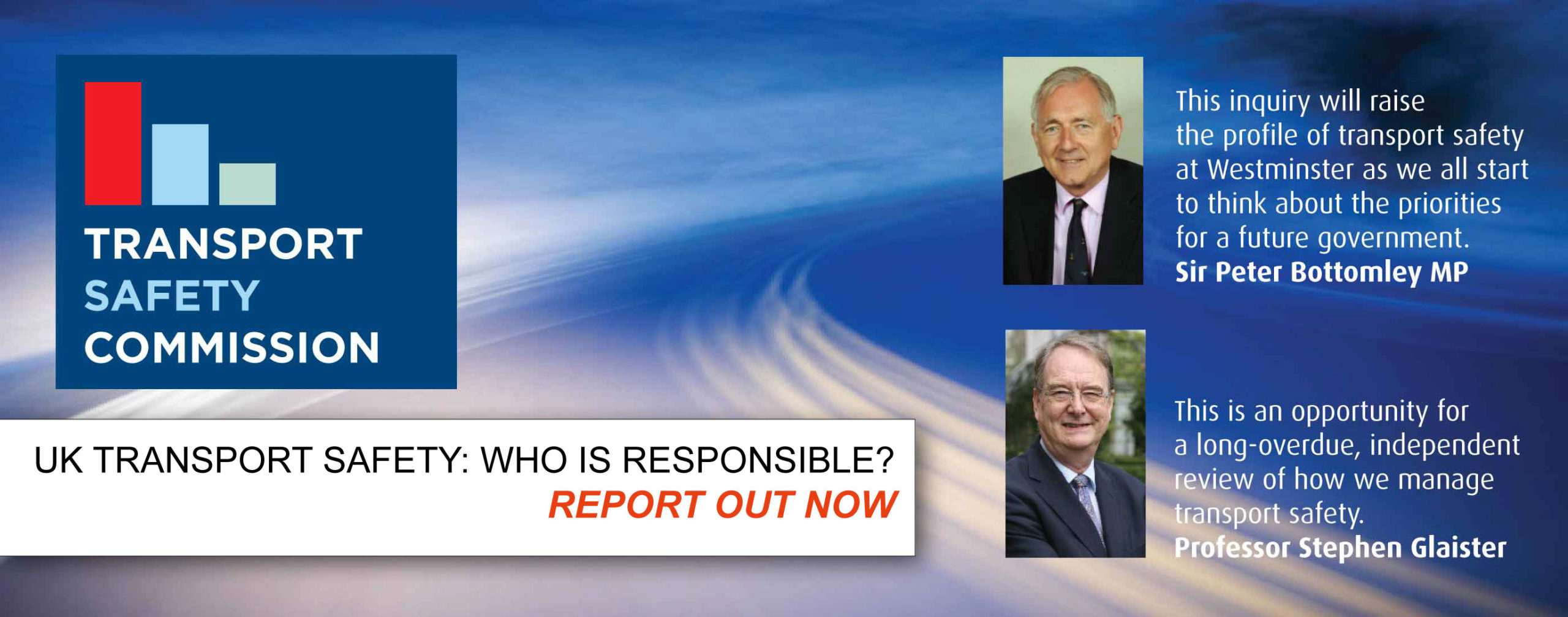Transport Safety Commission press release. Embargo – 00:01 hrs Wednesday 25 March 2015
Who should be responsible for road safety?
More than 130 years after the first cars took to the UK’s roads there is still no single independent body that has responsibility for investigating and learning from the accidents that take place on the public highway.
Since 1926 – when casualty figures were first recorded – some half a million people have died on the UK’s roads.
1,769 were killed in 2013 alone, compared with just 30 people in the air and four train passengers.
Accidents in the skies and on the railways are exhaustively studied by the Air Accident Investigation Branch and Rail Accident Investigation Branch respectively.
But while individual police forces collect statistics about road crashes and look for fault there is no independent organisation that looks beyond apportioning blame to analyse the underlying cause and make recommendations on systemic changes to prevent similar accidents reoccurring.
The current situation is highlighted in a new report – UK Transport Safety: who is responsible? – by the Transport Safety Commission. The Commission was established in autumn 2013 following a recommendation by the Transport Select Committee. This report is the result of the Commission’s first inquiry which was co-chaired by Professor Stephen Glaister, director of the RAC Foundation, and Sir Peter Bottomley MP.
Amongst the report’s recommendations are:
- improved arrangements for accident investigation so that learning is separated from the prosecution
- creation of an advisory body for road safety independent of government
- restore resources for road safety to recent historical levels to fund additional measures which would provide good value for money
- the setting of ambitious road casualty reduction targets by the government
- stronger leadership from Central government and more coordinated action across government departments
- recognition by the Health and Safety Executive, employers and Government that work-related road casualties are their responsibility
- adoption of a systems approach to casualty reduction
- better treatment for the victims of road traffic crimes
- improving actual safety and the perception of risk of active travel modes (walking and cycling)
The report notes that after several years of steady decline there was a rise in road casualties in 2014 which shows casualty reduction cannot be taken for granted.
Professor Glaister said:
“It seems perverse that we effectively have double standards when it comes to investigating deaths amongst the travelling public.
“No expense is spared when it comes to establishing the cause of harm on public transport and there is a well proven system for recommending improvement as a result of findings.
“Compare that with what happens on the roads. Perhaps there is a feeling that road users are masters of their own destiny and hence their lives are not as important. Yet many casualties are innocent parties and we should be protecting them as carefully as anyone who pays a rail or air fare.
“Around 30% of road deaths occur during the course of employment and greatly exceed those occurring in the workplace, yet the Health and Safety Executive’s priorities do not include work-related road safety.
“That all our recommendations refer to road rather than aviation and rail safety is a sad indictment of a continued collective failure to tackle an appalling situation that somehow is seen as acceptable by those in authority.”
ENDS
Contacts:
Philip Gomm – Head of External Communications – RAC Foundation
020 7747 3445 | 07711 776448 | philip.gomm@racfoundation.org
David Davies – Executive Director – PACTS
020 7222 7732 | david.davies@pacts.org.uk
Notes to editors:
The Transport Safety Commission:
The Transport Safety Commission was established in the autumn of 2013 partly in response to a House of Commons Transport Committee recommendation.[1] The role of the Commission is to inquire into transport safety matters, in order to assist with the development of policies that will reduce risk and bring about continued reduction in transport-related casualties. The Commission is an independent body with members drawn from the UK Parliament and from the air, rail and road safety professions and related sectors.
The inquiry had been funded by donations from the Safer Roads Foundation and the Rees Jeffreys Road Fund.
Co-Chairs:
- Sir Peter Bottomley MP, Member of Parliament for Worthing West (Conservative)
- Professor Stephen Glaister CBE, Director, RAC Foundation
Commission Members:
- John Abbott Director of National Programmes Rail Safety & Standards Board (RSSB)
- Professor Richard Allsop OBE, Emeritus Professor of Transport Studies, University College London
- Jeanne Breen OBE, Principal, Jeanne Breen Consulting (resigned 19 March 2015)
- Kate Carpenter, Divisional Director, (Traffic and Safety) Jacobs /The Chartered Institution of Highways & Transportation
- Dr Nicola Christie, Director of the Centre for Transport Studies, University College London
- Keith Conradi, Chief Investigator, Air Accidents Investigation Branch
- Chief Constable Suzette Davenport, Association of Chief Police Officers
- Dr Rob Hunter, Head of Flight Safety, British Airline Pilots Association
- Dr Julian Huppert MP, Member of Parliament for Cambridge (Liberal Democrat), House of Commons
- Ben Johnson, Senior Delivery Planning Manager, Road Safety, Transport for London
- Professor Mike Kelly, Director of the Centre for Public Health, National Institute for Health and Care Excellence
- Dr David Pencheon, Director Sustainable Development Unit, NHS England and Public Health England
- Barry Sheerman MP, Member of Parliament for Huddersfield (Labour/Co-operative), House of Commons
- Jason Torrance, Policy Director, Sustrans
More details about the Transport Safety Commission and its work can be found on the website of the Parliamentary Advisory Council on Transport Safety (an All-Party Parliamentary Group) which provides the secretariat:
https://www.pacts.org.uk/transport-safety-commission/
This press release is available here in PDF format.
[1] Transport Select Commission: Ending the Scandal on Complacency, 2008

